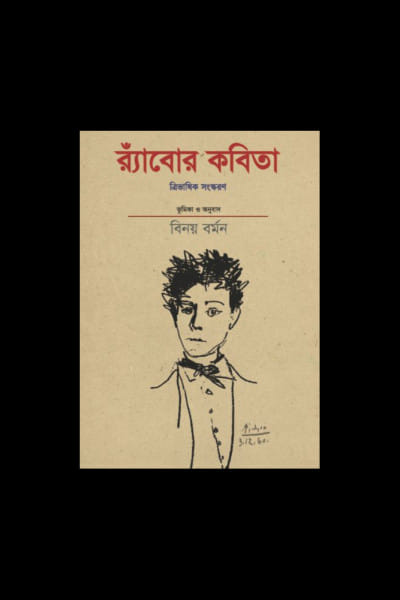Rimbauder Kobita: Trilingual Edition

The trilingual edition of Rimbaud, Rimbauder Kobita (Poems of Rimbaud), with an introduction and translation by Binoy Barman, can be a superb feast for the lovers of poetry, particularly for those who dare to enter the cryptic and labyrinthine, yet the irresistibly beautiful world of the great French poet Arthur Rimbaud (1854-1891), a prodigy in his lifetime who broke up with poetry only at the age of 21 but astonishingly left behind him an incredible legacy heralding a new movement in world poetry that we know as surrealism. Before I go any farther, i.e. sharing my wonderful experience of savouring the poems as translated by Binoy Barman, I would like to congratulate him for accomplishing a great job by hosting the three versions – original French, Bangla and English of Rimbaud under the same cover. Those who are fastidious as reader and possess an inquisitive mind but lack the knowledge of French will be able to compare the Bangla translation with that of English translated by some of the renowned Rimbaud translators. To make this edition utterly comprehensive, Barman has mentioned the name of the English translator of each of the poem. And those who have the extraordinary linguistic power of accessing all the three versions, this edition is a kind of buffet for them – they will be able to taste three versions of the same poem!
Now the most clichéd but a necessary question would definitely follow – how is the quality of Barman's translation? In this juncture I would like to say something from the viewpoint of modern translation theories and practices, i.e. translation as a creative rewriting draws attention to the fact whether a translator is successful in representing any text artistically and creatively in the target language. So the first concern is whether the translated text remains a creative work after going through the process of decoding the source language to recoding into the target language. Or, in simple words, in case of poetry, we want to know whether it is still poetry after the translation as some people have the (mis)conception that poetry cannot be translated. Besides, the task of a translator is not merely to translate the language of the text but the translation of culture, that is, "the negotiation between texts and between cultures". In this context I would unreservedly assert that in most cases Binoy Barman is successful in translating Rimbaud in his target language Bangla though the quality may vary in degree from poem to poem. Himself a prolific poet, Barman could easily maneuver his own poetic self while translating the poems. Therefore, when you will read his work in this volume, you will get the fresh experience of enjoying Rimbaud in Bangla original.
The standard and trend that Buddhadeva Bose had set in his translation of Baudelaire's poems have been followed by the translators of successive generations over the years. The most outstanding feature of that volume is its insightful introduction to Baudelaire that encompasses not only the essential characteristics of Baudelaire's poetry but also the making up of the poet and the literary movements like romanticism, modernism and symbolism imperative to understand him. Emerging poets and writers, critics and scholars, and the lovers of poetry all have benefited from that volume and are being benefited still today. When I was reading Rimbauder Kobita by Binoy Barman, that volume of Baudelaire's poems by Bose immediately came to my mind, particularly when I was reading the introduction. In fact the present translator has also adhered to the principles set by Bose. Even though it is not as pervasive and as perspicacious as that of Bose, Barman is far above being successful in capturing the life and work of Rimbaud in his introduction. From this introduction we get a brilliant portrayal of the libertine and ever restless Rimbaud, the bohemian genius, who has been influencing thousands of poets and artists all over the world for more than a century by his unconventional lifestyle and extraordinary poetic talent. Truly Rimbaud has got his due tribute in this volume by Binoy Barman. But an intriguing factor about the translation of this volume that may give a scope to the morose and shrewd critics (who don't even spare Buddhadeva Bose) to stigmatize the whole endeavour by Binoy Barman must be addressed at the ending part of this review, that is, the poems have been translated mostly from English translation only peripherally consulting the original French. So in a sense this volume may be regarded as the translation of translation. I would have not known this thing if the translator had not stated the fact in the introduction. And this statement or confession makes our job easy – we can evaluate the translation from that standpoint. And we can proceed with our reading of Rimbaud in Bangla original raising ourselves high above the petty and obsolete ideas of original-copy, faithful-unfaithful and "master-slave" concerning translations which never recognize translation as a creative work.
The reviewer is an Assistant Professor, Department of English, Daffodil International University. Email: [email protected]

 For all latest news, follow The Daily Star's Google News channel.
For all latest news, follow The Daily Star's Google News channel. 



Comments